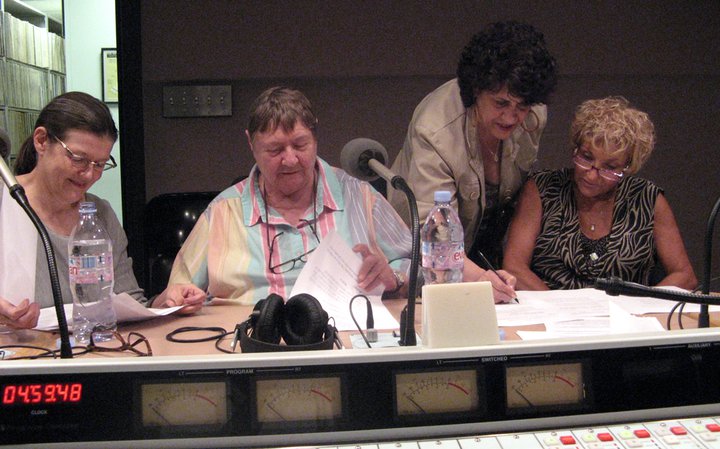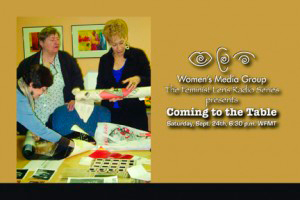Legacy and Lessons
< back | next >
click on titles to jump to sections
– Roslyn Fund at Chicago Foundation for Women
– Heritage into history
– The story continues
– Roslyn Fund at Chicago Foundation for Women
When the show closed and bills were paid, the Dinner Party Project in Chicago Steering Committee voted to donate the remaining $27,000 to the soon to be established Chicago Foundation for Women. Three years before the foundation began its grant making, The Roslyn Fund for Arts and Letters at Chicago Foundation for Women was created to support women in the arts. It was the first donor-advised fund contribution to Chicago Foundation for Women.
Thanks to The Roslyn Group and additional support over the years, Chicago Foundation for Women made grants totaling $61,000 to 27 projects that use the arts to uplift women and girls from 1985 to 2011 through The Roslyn Fund for Arts and Letters. (See “Roslyn Fund Grant Recipients” at right)
The fund came full circle at its closing in 2011 when it made its final grant to The Dinner Party Project in Chicago to reflect on and document the local effort to bring The Dinner Party exhibition to Chicago thirty years prior. When members of the group visited the long-term installation of The Dinner Party at the Brooklyn Museum in 2007, they found there was no mention of the Chicago effort among Dinner Party documentations other than the fact the city was one of the exhibit’s many stops. Ironically, the project 30 years later serves the same purpose Judy Chicago’s artwork and its Chicago hosts had initially asserted: to make sure women are not written out of history—and to celebrate the range and beauty of our heritage.
The Women’s Business Development Center, one the many feminist organizations formed by women from the Dinner Party Project following their experience, served as the grant’s fiscal agent.
– Heritage into history
Upon the 30th anniversary of this extraordinary experience, the women of the Dinner Party Project in Chicago wanted to recognize and capture the lessons learned from it in four ways:
1. Website
The Dinner Party exhibition is now on long-term installation at the Brooklyn Museum in New York, with a website that mentions that the show opened in San Francisco, then went to Houston, Boston, Cleveland, and Chicago but does not include a link to these sites nor name any of the feminists who made the shows possible. This website for The Dinner Party Project in Chicago enables scholars, activists, and organizers to learn how the group created a working organization to present this exhibition. Its purpose is to provide a model for other groups who hosted the exhibit to include their communities in the history of The Dinner Party exhibition.
2. Memoir Workshops
To address the concern that the history of the women’s movement is vanishing, as leaders from the 70’s retire or pass away, a two-day workshop to capture the stories was videotaped and chronicled. Twelve Dinner Party Project in Chicago Steering Committee alumnae attended the workshops in March 2011, eager to anchor their reflections from three decades prior. Their intention was to pass on their experiences and insights to a new generation and encourage others to attempt and implement bold plans. Clips from the video-taped workshops featured on this website capture the commitment and passion that made the Chicago exhibition a success, and how this experience linked them in the struggle for women’s equality over the last three decades. Watch LEGACY AND LESSONS at right. The full video tape is housed at University of Illinois Chicago Archives.
3. Women’s Media Group/Feminist Lens radio segment: Coming to the Table
In the summer of 2011, The Dinner Party Project in Chicago funded the production of a radio segment of the Feminist Lens program through the Women’s Media Group. “Coming to the Table” focuses on the creation and implementation of The Dinner Party Project in Chicago and features interviews with project alumnae Jean Hunt, Hedy Ratner, Barbara Ciurej and Bette Cerf Hill as they revisit the life-changing experience. Producer Maya Friedler contributes commentary. Musical Director Jamie O’Reilly focuses on music of the era.
Listen to the podcast of Coming to the Table at Women’s Media Group/Feminist Lens.
4. 30th Anniversary Celebrations
On the 30th Anniversary of the exhibition, several events were planned and media invited:
—Listening party for the Feminist Lens radio program “Coming to the Table” which aired on September 24, 2011 on WFMT Radio (98.7) at the Bette Cerf Hill Gallery honoring those involved with the project.
— An interactive timeline was created through “The Dinner Party Project in Chicago” Facebook page asking people to contribute to a growing timeline of significant events in the local women’s movement. Entries will be integrated into the timeline and posted on this website on January 1, 2012. A flyer was distributed at the annual luncheon of Chicago Foundation for Women on October 3, inviting women to add to the timeline.
— On October 6, 2011, alumnae of The Dinner Party Project in Chicago returned to the actual site where they had hosted The Dinner Party exhibition thirty years prior. They gathered for a private ‘dinner party’ on the 13th floor of the Franklin Building, which now houses residential condominiums, to celebrate the launch of this website documenting their story and the anniversary of the project.
– The story continues
A majority of the leaders from The Dinner Party Project in Chicago have continued to meet more than once a year to support each other. Many of them have become recognized as authors, photographers, organizers, teachers, civic leaders, and entrepreneurs. Using what they learned from their involvement with the project, they have been able to lead and manage a score of successful organizations winning considerable victories for gender, social, and economic equality.
In addition to the feminist-driven aura of excitement and historical context The Dinner Party Project in Chicago created for the city, it is credited with breathing life into and altering the face of the South Loop. It became a catalyst for renovation and increased interest in the area. Thanks to Bette Cerf Hill, then the director of the South Loop Planning Board and the generosity of Royal Faubian and Columbia Homes, the renovation of the Franklin Building was at the fore of the conversion of vacated industrial spaces into loft living, revitalizing a defunct business district into a vibrant community.
As we face the erosion of our reproductive rights, as we still are fighting for economic parity, the struggle for women’s equality continues. As Bette Cerf Hill commented “Just when we think we’ve won a battle, there is a whole new battle …and it’s the same old battle…what I’d like to say is we’re not done.”
return to top | next page
|


